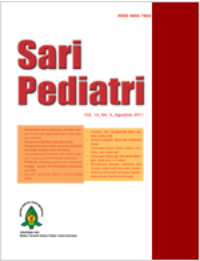Laporan Kasus Berbasis Bukti : Prevalensi dan Faktor-Faktor yang Berpengaruh terhadap Masalah Kesehatan Jiwa pada Remaja selama Pandemi Corona Virus Disease 2019 (COVID-19)
Sari
Latar belakang. World Health Organization (WHO) menetapkan Corona virus disease 2019 (COVID)-19 sebagai pandemi pada Maret 2020. COVID-19 telah menyebar dengan sangat cepat ke berbagai belahan dunia karena sangat infeksius. Hal ini mendorong pemerintah mengeluarkan beberapa kebijakan guna mengontrol penyebaran COVID-19 seperti penutupan sekolah maupun pembatasan sosial. Dampak kebijakan tersebut dan adanya ketakutan terhadap infeksi COVID-19 diperkirakan berdampak negatif terhadap kesehatan jiwa terutama pada kelompok rentan yaitu remaja.
Tujuan. Mengetahui apakah ada kaitan antara pandemic COVID-19 dengan masalah jiwa pada remaja.
Metode. Dilakukan pencarian di PubMed, Google Scholar, dan Cochrane dengan menggunakan kata kunci “depression”,”mental health”,”adolescent”, “COVID-19”. Hasil pencarian dievaluasi menggunakan kriteria eksklusi dan inklusi. Selanjutnya dilakukan telaah kritis dengan memerhatikan validitas, kepentingan, dan penerapan pada pasien terhadap artikel lengkap dari studi yang terseleksi.
Hasil. Diperoleh satu studi yang relevan dengan pertanyaan klinis dan memenuhi kriteria inklusi and eksklusi. Luaran dari studi ini memperlihatkan bahwa prevalensi masalah kesehatan jiwa cukup tinggi pada remaja selama pandemi COVID-19.
Kesimpulan. Angka kejadian depresi dan ansietas lebih tinggi pada kelompok perempuan, populasi yang tinggal di pedesaan, dan murid yang lebih senior. Namun, studi ini belum dapat membuktikan apakah pandemi COVID-19 menyebabkan masalah kesehatan jiwa pada remaja.
Kata Kunci
Teks Lengkap:
PDFReferensi
Jayaweera M, Perera H, Gunawardhana B, Manatunge J. Transmission of COVID-19 virus by droplets and aerosols: a critical review on the unresolved dichotomy. Environ Res (serial online).Juni 2020. Diunduh pada 18 Juli 2020. Didapat dari: https://www.ncbi.nlm.nih.gov/pmc/articles/PMC7293495/# ffn_sectitle.
World Health Organization. Timeline of WHO’s respose to COVID-19. Diunduh pada 9 Juli 2020. Didapat dari :https://www.who.int/news-room/detail/29-06-2020-covidtimeline.
Brooks S, Webster RK, Smith LE. The psychological impact of quarantine and how to reduce it: rapid review of the evidence. Lancet 2020;395:921-20.
World Health Organization. Adolescent mental health-mapping actions of nongovernmental organization and other international development organization. Diunduh pada 30 Maret 2020. Didapat dari https://www.hoint/jiwa_health/publication/adolescent_jiwa_health/en/.
Guessoum SB, Lachal J, Radjack R, dkk. Adolescent psychiatric disorders during the COVID-19 pandemic and lockdown. J Psych Res 2020;113:264-6.
Zhou SJ, Zhang LG, Wang L, dkk. Prevalence and socio-demographic correlates of psychological heath problems in Chinese adolescent during the outbreak of COVID-19. Eur Child Adolesc Psychiatry. 2020;29:749-58
Dharma K, Khan S, Tiwari R, dkk. Coronavirus disease 2019-COVID-19. Clin Microbiol Rev 2020;33:20.
Singhal T. A review of coronavirus disease-2019 (COVID-19). Indian J Pediatr 2020;87:281-6.
Golsberstein E, Wen H, Miller BF. Coronavirus disease 2019 (COVID-19) and mental health for children and adolescents. JAMA Pediatr 2020;174:819-20.
Hassanzadeh A, Heidari Z, Feizi A, dkk. Association of stressful life events with psychological problems: a large scale community-based study using grouped outcomes latent factor regression with latent predictors. Compute Math Methods Med (serial online). September 2017. Didapat dari : https://pubmed.ncbi.nlm.nih.gov/29312459/.
Rao WW, Xu DD, Cao XL, dkk. Prevalence of depresive symptom in children and adolescent in China: a meta-analysis of observational studies. Psychiatry Res 2019;272:790-3.
Kleinmann. Culture dan depression. N Engl J Med 2004;351:-951-3.
Klender KS, Karkowski LM, Presscot CA. Causal relationship between stressful life events and the onset of major depression. Am J Psychiatry 1999;156:837-41.
Verma R, Balhara YPS, Gupta CS. Gender differences in stress response: role of development and biological determinants. Ind Psychatry J 2011;20:4-10.
Lim GY, Tam WW, Lu Y, Ho CS, Zhang MW, Ho RC. Prevalence of depression in the community from 30 countries between 1994 and 2014. Sci Rep 2018;8:2861.
Putwain DW. Test anxiety in UK schoolchildren: prevalence and demographic patterns. Br J Educ Psychol 2007;77: 597-93.
Slobodskaya HR, Semenova NB. Child and adolescent mental health problems in Tyva, Republic Rusia, as possible risk factors for a high suicide rate. Eur Child Adolesc Psychiatry 2016;25:361-71.
Helm SV, Pollitt A, Bernett MA, Currant MA, Craig ZR. Differentiating environmental concern in the context of psychological adapation to climate change. Global Environ Chang 2018;48:148-56.
Wang C, Pan R, Wan X, dkk. Immediate psychological responses and associated factors during the initial stage of the 2019 corona virus disease (COVID-19) epidemic among the general population in china. Int J Environ Res 2020;12:1729.
Xi Liu, Tao LW, Li NC, dkk. Psychological status and behavioural changes of the public during the COVID-19 epidemic in China. Infect Dis Poverty 2020;58:3-11.
DOI: http://dx.doi.org/10.14238/sp24.2.2022.127-33
Refbacks
- Saat ini tidak ada refbacks.
##submission.copyrightStatement##
##submission.license.cc.by-nc-sa4.footer##
Email: editorial [at] saripediatri.org


Sari Pediatri diterbitkan oleh Badan Penerbit Ikatan Dokter Anak Indonesia
Ciptaan disebarluaskan di bawah Lisensi Creative Commons Atribusi-NonKomersial-BerbagiSerupa 4.0 Internasional.




